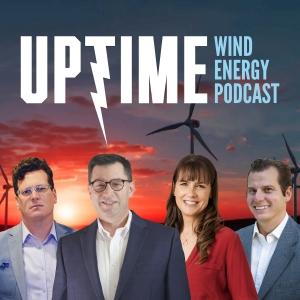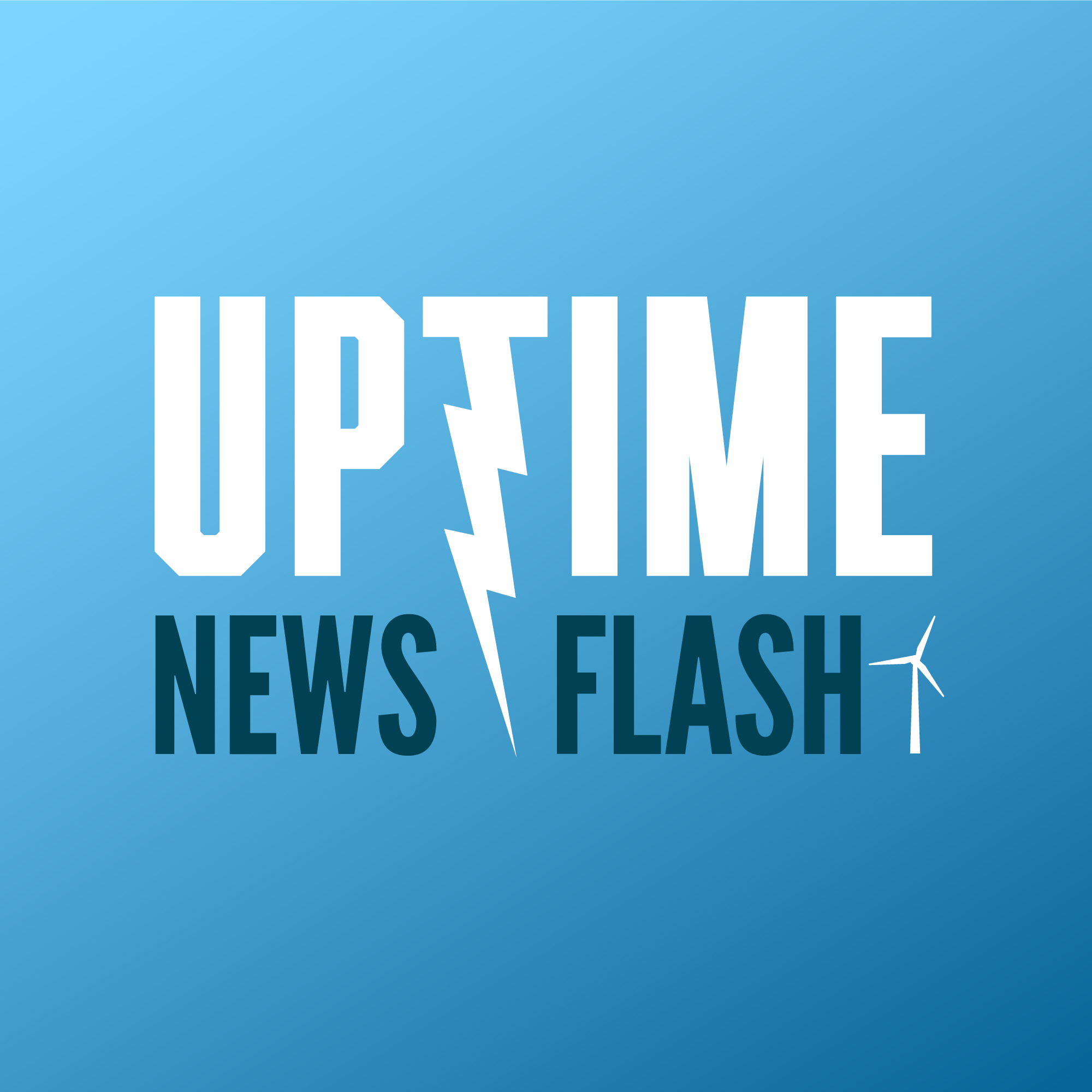The Uptime Wind Energy Podcast

Ocean Winds & Electrobras Offshore Brazil, Venterra Acquires Oceanscan
In this episode, we discuss Ocean Winds and Electrobras’ new partnership to develop offshore wind projects in Brazil, Copenhagen Infrastructure Partners’ strategic alliance with Stiesdal Offshore, and Venterra Group’s acquisition of Oceanscan to strengthen offshore wind services.
Sign up now for Uptime Tech News, our weekly email update on all things wind technology. This episode is sponsored by Weather Guard Lightning Tech. Learn more about Weather Guard’s StrikeTape Wind Turbine LPS retrofit. Follow the show on Facebook, YouTube, Twitter, Linkedin and visit Weather Guard on the web. And subscribe to Rosemary Barnes’ YouTube channel here. Have a question we can answer on the show? Email us!
Pardalote Consulting – https://www.pardaloteconsulting.com
Weather Guard Lightning Tech – www.weatherguardwind.com
Intelstor – https://www.intelstor.com
Wind Energy O&M Australia Conference – https://www.windaustralia.com

Welcome to Uptime News Flash. Industry news, lightning fast. Your hosts, Allen Hall, Joel Saxum, and Phil Totaro discuss the latest deals, mergers, and alliances that will shape the future of wind power. News Flash is brought to you by IntelStor. For market intelligence that generates revenue, visit www. intelstor.com.
Allen Hall: Ocean Winds and Electrobras have announced a new partnership to develop offshore wind projects in Brazil. The collaboration, revealed at Brazil’s WindPower 2024, combines Ocean Winds offshore wind development expertise with Electrobras position as a leader in Latin American energy. Ocean Winds currently manages about 18.
5 gigawatts of offshore wind projects globally. and has registered 15 gigawatts of wind projects across multiple Brazilian states. Now, Phil, OceanWind has been pretty aggressive in hooking up with other places to develop offshore wind. Brazil makes imminent sense.
Philip Totaro: Well, it does, as long as they get their act together on how they’re going to run their auctions and how the lease areas that they’ve identified are actually going to be kind of tendered out because they’ve allowed multiple different organizations to submit bids and, and layouts for, for offshore wind farms.
They’re still getting some of their site assessment data figured out and they don’t have any kind of regime established like they do for onshore wind as far as the, the power offtake auctions are gonna transpire and, and how that’s all gonna work. So there’s, there, it’s still kind of a relatively, Immature market with a huge amount of potential.
There’s I think something like 140 gigawatts of projects that have been proposed down there at this point including those by Ocean Winds, which would now presumably involve Electrobras. So they’re hoping to be able to leverage, this utility power offtake as a means to get their projects hopefully to the the front of the queue.
Joel Saxum: Like Phil said, as long as they can get some of the regulatory and politics and the PPA stuff figured out, they’re in a good place. Because not only do they have great wind resources, Brazil knows how to operate in an offshore environment. They’ve been doing offshore oil and gas there for many, many, many years.
So, Port facilities, work boats, all those things exist down there, and as does a mariner economy to boot. So, they build their own vessels, they do all kinds of great stuff in Brazil. They’ll be able to support the offshore wind market from a technical and operations standpoint. Easier than some of the emerging offshore markets will have.
Allen Hall: Copenhagen Infrastructure Partners has formed a strategic alliance with Stiesdal Offshore, acquiring a minority stake through its Copenhagen Infrastructure Partnership. Five Fund. The partnership focuses on driving innovation and cost efficiency in floating offshore wind technology. Stiesdal Offshore plans to expand its services from design and development of floating foundations to becoming a comprehensive provider of floating wind solutions.
The company has developed over 30 specific initiatives aimed at reducing capital expenditures in floating wind projects. All right, Phil, this is really interesting because floating wind cost structure is much higher than fixed bottom offshore wind for sure. But it looks like Stiesdal is going to actually take a good look at floating and try to reduce some of the costs, and Copenhagen Infrastructure Partners joining along with them makes a ton of sense.
Philip Totaro: It does and a little bit of this is, Danes doing things with other Danes but, The, the good news is this is kind of a mutually beneficial thing for, for both parties. Obviously, CIP has a lot of different options on the table as far as, floating foundation partners. And like you say, I mean, at this point, because of the lack of commercial deployment of floating, the, the LCOE doesn’t look, doesn’t look good.
Good compared to fixed bottom, but even our own projections based on scaling up the, the floating foundations looks like you’re gonna get a better cost per megawatt installed. LCOE for, for floating offshore. So, a company that has this kind of a pedigree with Heinrich’s background, as well as Peter Nicholson is their, their CEO.
They’re, they’re eminently qualified through their, their past history in Danish wind to be able to, to champion this. And Heinrich’s been working on this ever since he left Siemens, almost No, probably eight years ago or so now, I think at this point. So he’s putting, putting everything into making sure that, that this works and this kind of capital injection may, encourage them to get to that next step, which is plus this partnership will encourage the, the next step.
for them to take, which is getting firm orders for these floating foundations at scale and being able to establish go out and get the credit established for them to be able to, to put the fabrication facilities in place to start building these things.
Allen Hall: In other industry news, Venterra Group has acquired Oceanscan, strengthening its offshore wind service capabilities.
Oceanscan provides subsea and non destructive test equipment, geotechnical services, and specialist personnel to the offshore wind sector. The acquisition was supported by a 30 million equity investment from General Atlantic’s Beyond Net Zero and First Reserve, along with a 110 million in bank facility from HSBC, NatWest, Rabobank, and Citibank.
Oceanscan’s operations span multiple locations, including Aberdeen, Houston, Singapore, with specialized subsidiaries across the United Kingdom. The offshore, obviously in the UK, is really developed and it’s expanding rapidly with the change in government. And investment is starting to roll in on some of these offshore support organizations.
Philip Totaro: It is, and it’s interesting because Venterra’s Typically known as being more of a, maintenance provider and, and overall kind of project management. They’ve been, however, branching out recently with investments in other companies. And this acquisition. Just kind of broadens out the scope of what they’re able to, to offer.
So, I think it’s it’s a good thing certainly from, from their perspective where they, they want to be able to offer more reach and more scope, but it’s coming at a point in time when, as you mentioned, there’s a tremendous amount of work that Oceanscan’s going to need to be able to undertake to support those projects.
So, I think this is coming at I think this is coming at a great time for both companies and it, it should prove to be a fruitful thing for Venterra.






 Visit Podcast Website
Visit Podcast Website RSS Podcast Feed
RSS Podcast Feed Subscribe
Subscribe
 Add to MyCast
Add to MyCast